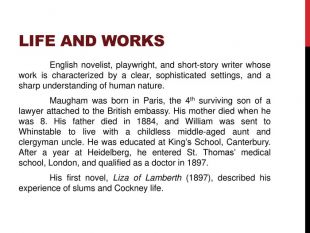Презентація "English Modernism"
Про матеріал
Презентація містить матеріал англійсьою мовою з курсу літертури Англії. Матеріал може бути використано на уроках літератури Англії в школах з поглибленим вивченням іноземних мов. Перегляд файлу
Зміст слайдів
pptx
До підручника
Англійська мова (9-й рік навчання, профільний рівень) 10 клас (Несвіт А.М.)
Оцінка розробки

Безкоштовний сертифікат
про публікацію авторської розробки
про публікацію авторської розробки
Щоб отримати, додайте розробку
Додати розробку
















